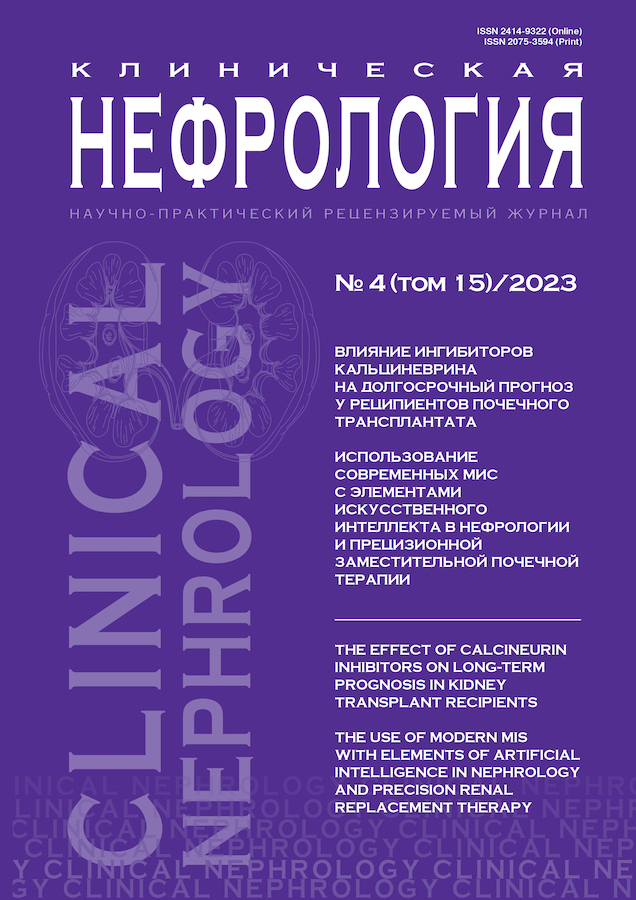Genetic markers of thrombogenic risk in patients on program hemodialysis
- Autores: Voskresenskaya N.A.1, Orlova G.M.2, Romazina N.Y.2
-
Afiliações:
- Irkutsk Regional Clinical Hospital
- Irkutsk State Medical University
- Edição: Volume 15, Nº 4 (2023)
- Páginas: 11-16
- Seção: Original Articles
- URL: https://journals.eco-vector.com/2075-3594/article/view/630882
- DOI: https://doi.org/10.18565/nephrology.2023.4.11-16
- ID: 630882
Citar
Texto integral
Resumo
Objective. Evaluation of the possible influence of genetic markers of thrombogenic risk on hemostasis in patients on program hemodialysis
Material and methods. The frequency of detection of polymorphism in 12 genes of the hemostasis system was determined in 70 dialysis patients.
Results. Polymorphism of various genes was found in all patients. The most frequently detected polymorphism was the 5G(675)4G polymorphism of the PAI-1 gene. A high frequency of polymorphism of folate cycle genes was revealed. In patients with thrombosis, the frequency of polymorphism of the platelet receptor β-3 fibrinogen gene ITGB3 1565 T>C (Leu33Pro) was significantly higher than in patients without thrombosis (40% versus 14.3%; P = 0.016). Polymorphism of this gene was identified as a factor associated with the development of thrombosis in dialysis patients (OR=4.0, 95% CI 1.25–12.8). In patients with thrombosis, a combination of polymorphism of the PAI-1 gene, platelet factor genes ITGB3 and ITGA2 and folate cycle genes MTHFR: 1298 A>C and MTHFR: 677 C>T was significantly more often determined. The combination of polymorphisms of these genes was also associated with the development of thrombosis in dialysis patients.
Conclusion. Dialysis patients may have a genetic predisposition to the development of thrombotic complications. A genetic factor associated with a high risk of thrombosis was the 1565 T>C (Leu33Pro) polymorphism of the platelet receptor β-3 fibrinogen gene ITGB3, as well as a combination of polymorphisms of the PAI-1 gene, platelet factor genes and the folate cycle.
Texto integral
Sobre autores
Nadezhda Voskresenskaya
Irkutsk Regional Clinical Hospital
Autor responsável pela correspondência
Email: nad4756@mail.ru
Cand. Sci. (Med.), Nephrologist at the Dialysis Department, Irkutsk Regional Clinical Hospital
Rússia, IrkutskGalina Orlova
Irkutsk State Medical University
Email: vicgal@yandex.ru
ORCID ID: 0000-0003-1805-8641
Dr.Sci. (Med.), Professor at the Department of Hospital Therapy, Irkutsk State Medical University
Rússia, IrkutskNina Romazina
Irkutsk State Medical University
Email: kuzinanina@yandex.ru
ORCID ID: 0009-0008-5308-4769
Cand. Sci. (Med.), Teaching Assistant at the Department of Hospital Therapy, Irkutsk State Medical University
Rússia, IrkutskBibliografia
- Андрусев А.М., Перегудова Н.Г., Шинкарев Н.Б., Томилина Н.А. Заместительная почечная терапия хронической болезни почек 5 стадии в Российской Федерации 2016–2020 гг. Краткий отчет по данным Общероссийского Регистра заместительной почечной терапии Российского диализного общества. Нефрология и диализ. 2022;24(4):555–65. doi: 10.28996/2618-9801-2022-4-555-565. [Andrusev A.M., Peregudo-va N.G., Shinkarev M.B., Tomilina N.A. Kidney replacement therapy for end Stage Kidney disease in Russian Federation, 2016-2020. Russian National Kidney Replacement Therapy Registry Report of Russian Public Organization of Nephrologists Russian Dialysis Society. Nephrol. Dial. 2022;24(4):555–65 (In Russ.)].
- Мельник А.А. Система гемостаза и ее регуляция при нарушении функциональной способности почек. Почки. 2016;3:57–75. doi: 10.22141/2307-1257-3-17-2016-76541. [Melnik A.A. The hemostasis system and its regulation in violation of the functional ability of the kidneys. Pochki. 2016;3:57–75 (In Russ.)].
- Момот А.П. Эволюция представлений о тромбофилии и ее роли в патологии человека. Проблемы клинической медицины. 2012;1–4:10–5 [Momot A.P. The evolution of ideas about thrombophilia and its role in human pathology. Probl. Clin. Med. 2012;1–4:10–5 (In Russ.)].
- Момот А.П. Проблема тромбофилии в клинической практике. Рос. журн. детской гематологии и онкологии. 2015;1:36–48. doi: 10.17650/2311-1267-2015-1-36-48. [Momot A.P. The problem of thrombophilia in clinical practice. Rus. J. Pediatr. Hematol. Oncol. 2015;1:36–48 (In Russ.)].
- Gao X.-H., Zhang G.-Y., Wang Y., Zhang H.-Y. Correlations of MTHFR 677C>T polymorphism with cardiovascular disease in patients with end-stage renal disease: a meta-analysis. PLoS One. 2014;9(7):e102323. doi: 10.1371/journal.pone.0102323.
- Grupp C., Troche-Polzien I., Stock J., et al. Thrombophilic risk factors in hemodialysis: association with early vascular access occlusion and patient survival in long-term follow-up. PLoS One. 2019;14(9):e0222102. doi: 10.1371/journal.pone.0222102.
- Шило В.Ю., Денисов А.Ю., Козлова Т.В. Наследуемые и приобретенные тромбофилии как факторы риска тромбоза артериовенозной фистулы у больных на программном гемодиализе. Нефрология и диализ. 2005;7(2):161–66. [Shilo V.Yu., Denisov A.Yu., Kozlova T.V. Inherited and acquired thrombophilia as risk factors for arteriovenous fistula thrombosis in patients on programmed hemodialysis. Nephrol. Dial. 2005;7(2):161–66 (In Russ.)].
- Kakaei F., Mirabolfathi S., Yavari N., et al. Hereditary thrombophilia and thrombosis of tunneled hemodialysis catheters: A single center study. J. Cardiovasc. Thoracic Res. 2021;13(1):79–83. doi: 10.34172/jcvtr.2021.06.
- Марковский А.В. Частота полиморфизма генов наследственной тромбофилии у женщин с нарушениями репродуктивного здоровья. Атеротромбоз. 2018;1:70–4. [Markovsky A.V. The frequency of genetic polymorphism of hereditary thrombophilia in women with reproductive health disorders. Atherothrombosis. 2018;1:70–4 (In Russ.)].
Arquivos suplementares








